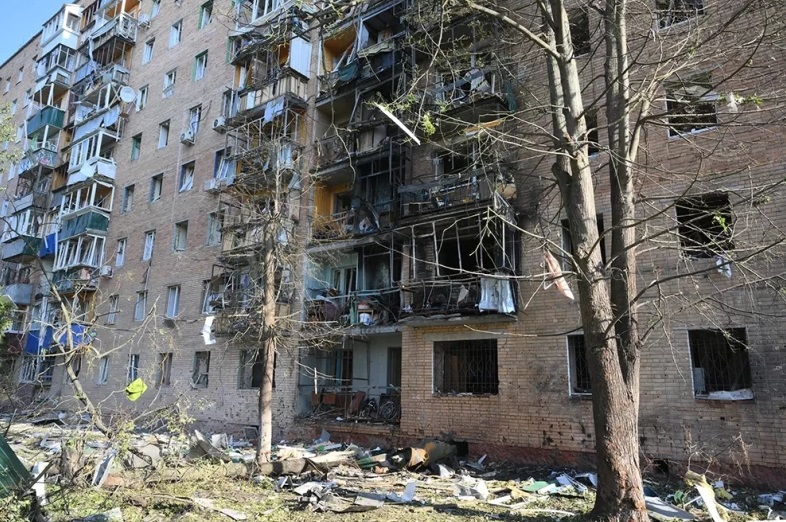 Results of the terrorist attack of the Ukrainian Armed Forces on the Kursk region.
Results of the terrorist attack of the Ukrainian Armed Forces on the Kursk region.
Photo: RIA Novosti
Enemy will receive proper response in Russia's border regions, said Russian President Vladimir Putin.
"The enemy will certainly receive a proper response, and all the goals we face will undoubtedly be achieved," Putin said at an operational meeting with representatives of the law enforcement on the situation in the Kursk region.
Kiev's action in Russia's Kursk Region aims to stop the offensive of Russian troops along the front line, Putin said.
"Such actions, of course, pursue the main military goal of stopping the offensive of our troops to completely liberate the territory of the Lugansk [also known as Luhansk] and Donetsk People's Republics, the territory of Novorossiya," Putin said.
The pace of the offensive of the Russian forces on the front line after the events in the Kursk Region not only did not decrease, but increased by 1.5 times, Putin said, adding that despite Kiev's provocations, Russian troops were advancing along the entire line of contact.
The main task of the Russian Defense Ministry at the moment is to push the Ukrainian troops back from Russian territory, the president added. Russian border guards must ensure reliable protection of the state borders, he also said.
The fight against Ukrainian sabotage and reconnaissance groups is one of the main tasks of work in the Kursk Region, Putin added.
The situation in the Kursk Region shows that Kiev rejects all the peace proposals of Moscow and mediators, Putin
"Apparently, the enemy is striving to improve its negotiating positions in the future, but what kind of negotiations can we talk about at all with people who indiscriminately strike at civilians, civilian infrastructure, or try to create a threat to nuclear energy facilities? What can we talk about with them at all?" Putin said.
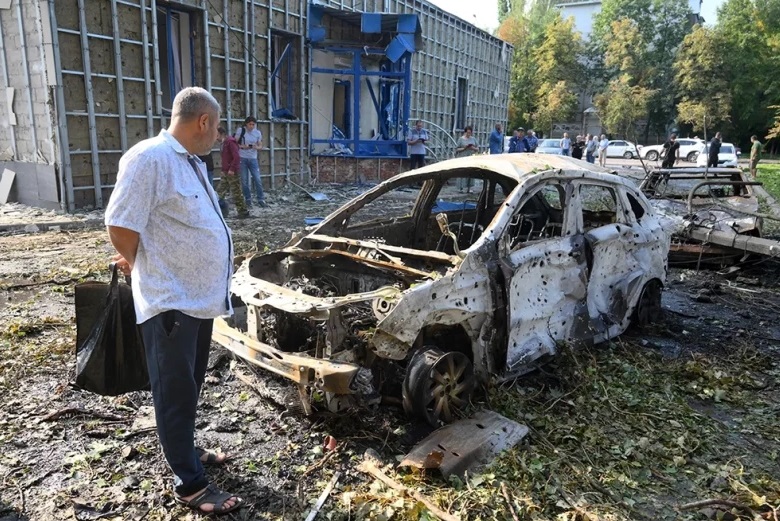 Results of the terrorist attack of the Ukrainian Armed Forces on the Kursk region.
Results of the terrorist attack of the Ukrainian Armed Forces on the Kursk region.
Photo: RIA Novosti
The attack by the Ukrainian Armed Forces, which resulted in a fire in the area of the Zaporozhye Nuclear Power Plant's (ZNPP) cooling towers, breached the plant's physical integrity, creating an unprecedented threat to nuclear safety, the plant's spokesperson, Yevgeniya Yashina, told Sputnik.
"In essence, this attack is one of the elements of disabling the station. This is an unprecedented threat to nuclear safety, since the nuclear power plant has suffered such serious damage for the first time. The physical integrity of the nuclear power plant has been breached, thereby breaching the basic principles of the IAEA," Yashina said.
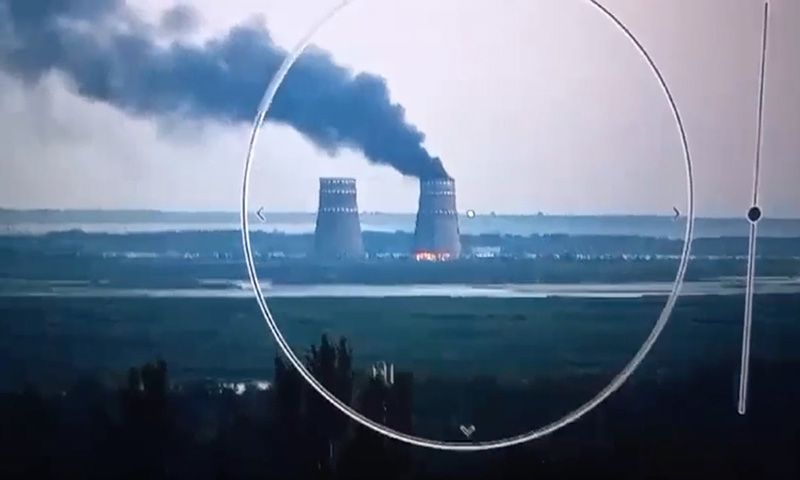 Photo: Global Times
Photo: Global Times
Later, Russian state corporation Rosatom said that one of the plant's cooling towers was "seriously damaged" by the attack.
"As a result of the attack by the Ukrainian Armed Forces, the cooling tower of the Zaporozhye NPP was seriously damaged," the statement says.
According to Rosatom, "on August 11, at 20:20 and 20:32, one of the two cooling towers of the Zaporozhye NPP was directly struck by Ukrainian attack drones, resulting in a fire with burning [of] internal structures. By 23:30, the main fire was extinguished by the Ministry of Emergency Situations."
The plant was attacked by the Ukrainian Armed Forces with a kamikaze drone, Yashina confirmed to Sputnik.
"It was established that the nuclear power plant had been attacked by a kamikaze drone of the Ukrainian Armed Forces," Yashina said.
"The fire in the area of the NPP's cooling towers, which started as a result of the shelling by the Ukrainian armed forces, has been localized, and there are no threats of further burning," the ZNPP said on Telegram.
"IAEA experts witnessed strong dark smoke coming from ZNPP's northern area following multiple explosions heard in the evening. Team was told by ZNPP of an alleged drone attack today on one of the cooling towers located at the site," the IAEA said in a statement.
Rosatom called the attack an act of nuclear terrorism in a statement on Monday.
"We would like to draw your attention to the fact that today's strike was carried out on the NPP equipment, the main task of which is to cool water during normal operation of the plant. Thus, this event can be characterized as an act of nuclear terrorism on the part of the Ukrainian authorities," the statement says.
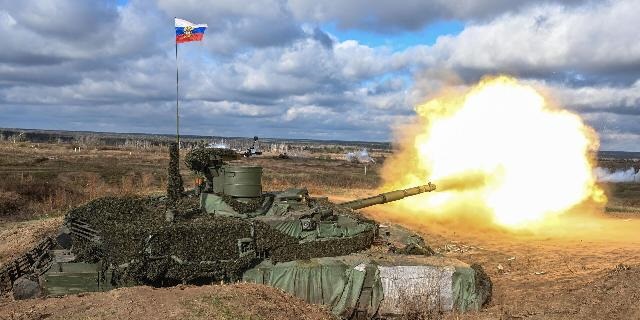 Photo: RIA Novosti
Photo: RIA Novosti
The Russian armed forces will retaliate against the regime in Kiev for its barbaric attacks on the western Russian regions, Foreign Ministry spokeswoman Maria Zakharova said.
"We strongly condemn these barbaric terror acts.... We have no doubt that the organizers and perpetrators of these crimes as well as their foreign sponsors will be held accountable. A harsh response from the Russian armed forces will not take long," she said.
The spokeswoman said the missile and drone attacks launched by Ukraine at Russian regions in the past few days were aimed at destroying civilian infrastructure and killing civilians and were "clearly terrorist in nature."
"The regime in Kiev continues its acts of terrorism with the sole purpose of intimidating civilians in Russia. It understands perfectly well that these barbaric acts are pointless from the military viewpoint but continues to work off the loans issued by its masters," she said.
The Foreign Ministry again called on international organizations to condemn the terrorist attacks by Ukrainian militants, although Zakharova said she was confident that "shamefaced silence" would be their only response.
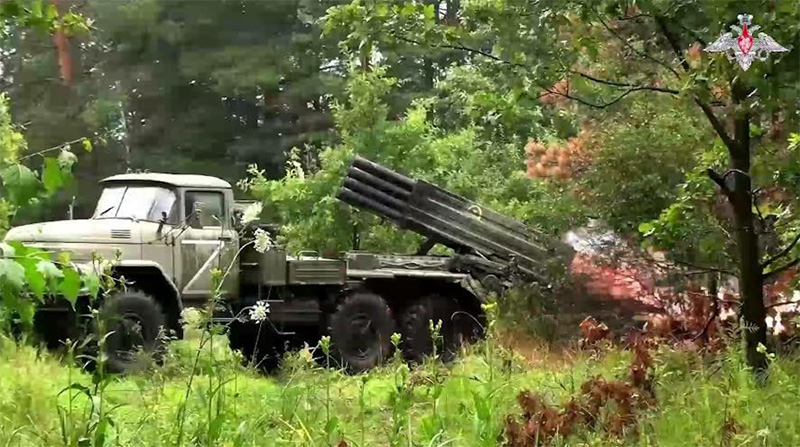 Photo: MoD
Photo: MoD
Russian Defence Ministry report on repelling an invasion attempt of the AFU on the territory of the Russian Federation (13 August 2024):
The Armed Forces of the Russian Federation continue to repel the AFU attempt to invade the territory of the Russian Federation.
Over the past 24 hours, active actions of the Sever Group of Forces and arrived reserves, army aviation and unmanned aerial vehicles, and artillery fire prevented enemy mobile armoured groups from getting into the rear of Russian territory close to Obshchiy Kolodez, Snagost, Kauchuk, and Alekseyevsky.
An attack launched by the 82nd Airborne Assault Brigade of the Armed Forces of Ukraine in the direction of Martynovka has been repelled. Up to fifteen AFU personnel, two armoured fighting vehicles, and two motor vehicles were neutralised.
Aviation and artillery strikes hit manpower and hardware of 22nd, 61st, 115th mechanised brigades, and 80th Airborne Assault Brigade close to Mikhailovka, Korenevo, Nikolayevo-Daryino, Oleshni, Sudzha, and Nikolayevka.
Up to 15 Ukrainian soldiers and four Stryker armoured personnel carriers were neutralised; six Ukrainian servicemen have been taken prisoners.
Aviation and missile troops inflicted fire damage on AFU reserves close to Miropolye, Mogritsa, and Petrushevka in Sumy region.
During the day, the AFU losses amounted to up to 420 Ukrainian troops, 55 armoured vehicles, including three tanks, eight armoured personnel carriers, one infantry fighting vehicle, 43 armoured fighting vehicles, 31 motor vehicles, one MLRS launcher, and one artillery gun.
Since the beginning of hostilities in Kursk region, the enemy lost up to 2,030 Ukrainian troops, 35 tanks, 31 armoured personnel carriers, 18 infantry fighting vehicles, 179 armoured fighting vehicles, 78 motor vehicles, four anti-aircraft missile systems, two MLRS launchers, and 14 field artillery guns.
The operation to neutralise the AFU units is in progress.
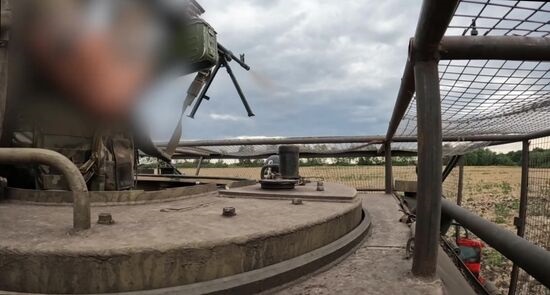 In this handout video grab released by the Russian Defence Ministry, a still image from a Russian serviceman's body camera video shows the assault on position of Ukrainian armed forces following Ukraine's incursion into the Kursk region, Russia.
In this handout video grab released by the Russian Defence Ministry, a still image from a Russian serviceman's body camera video shows the assault on position of Ukrainian armed forces following Ukraine's incursion into the Kursk region, Russia.
Photo: Sputnik
Ukrainian servicemen captured in Kursk region said during interrogation that they had only been in the Russian region for about a day and had been quickly captured after the invasion of Russian territory began, Russian security agencies told Sputnik, which obtained a new video of the prisoners.
Sputnik showed the first footage showing how an assault group of the 80th separate airborne assault brigade of the Ukrainian army was captured. Russian security agencies told the agency that the Ukrainian servicemen had been captured near the settlement of Martynovka.
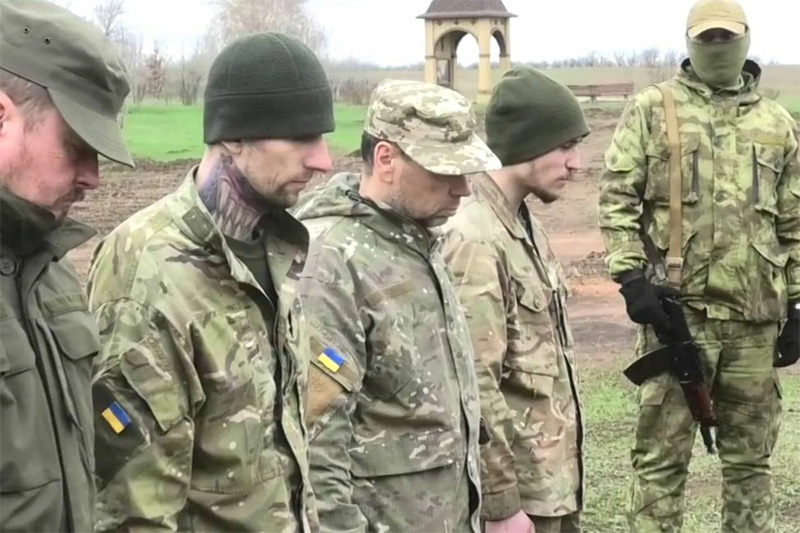 Ukrainian servicemen captured in Kursk region.
Ukrainian servicemen captured in Kursk region.
MoD video screenshot
Ukrainian Armed Forces units numbering up to a 1,000 people launched an offensive at 5.30 a.m. on August 6 to seize territory in the Kursk region, their advance was stopped, Russian Chief of the General Staff Valery Gerasimov said. He emphasized that the operation in the Kursk region would be completed by defeating the enemy and reaching the state border.
The Russian Defense Ministry reported on August 12 that Ukrainian forces had lost more than 1,600 servicemen, 32 tanks and 23 armored personnel carriers during the entire period of military operations in the Kursk direction.
Russian President Vladimir Putin stated that the Kiev regime had carried out a provocation, conducting indiscriminate shooting, including at civilian targets. Putin said that the enemy would receive a worthy response, all Rissia's goals would be achieved.
In the Kursk, as well as the Belgorod and Bryansk regions, a counter-terrorism operation regime is in effect to ensure the safety of citizens.
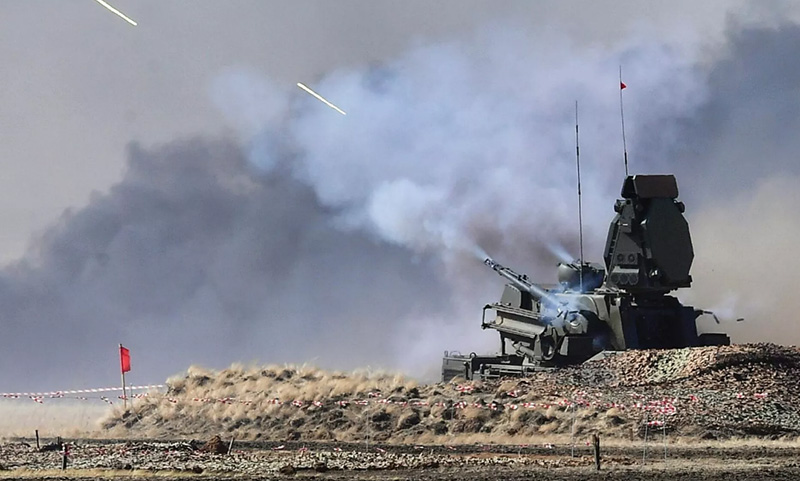 Photo: Sputnik
Photo: Sputnik
Ukraine’s incursion into Russian territory in the Kursk region in an attempt to save Kiev from imminent defeat is Zelensky's riskiest decision yet, as Moscow will do everything possible to stop this invasion, wrote journalist Michael Clarke in an article for The Times.
"Kiev is evidently prepared to risk valuable soldiers and equipment to make some sort of stand here. Zelensky’s critics will argue that this is a misuse both of the lives of the troops and the heavy metal," said the publication.
The AFU attack in Kursk region will not change the course of hostilities, as Russian troops will do everything possible to expel the enemy from their territory.
Some analysts view this ongoing Kursk cross-border offensive as a last-ditch and desperate ploy to force an escalation so that the US and NATO will more directly intervene, or else to gain leverage, notes ‘The Zero Hedge’.
Others say this is all PR-driven and that Ukrainian troops are being sacrificed in what's essentially a suicide mission for propaganda purposes and as but a ‘temporary blow to Kremlin morale’...
It also appears a distraction of sorts from the front lines, where Ukraine is fairing poorly and having serious manpower problems. It might be forcing Russia to relocate reservists from the Donbass region as well in order to urgently protect its borders.
Meanwhile, the world is witnessing Russia fight a war to repel invaders on its own territory in the southern region, with state media describing a Ukrainian command and control center having been destroyed in the Kursk region.
“A missile strike has destroyed a Ukrainian command-and-control center in Russia’s Kursk Region,” the Defense Ministry in Moscow has claimed, releasing video of the strike. Ukrainian forces launched a large-scale incursion into the border region earlier this week, ‘The Zero Hedge’ stresses.
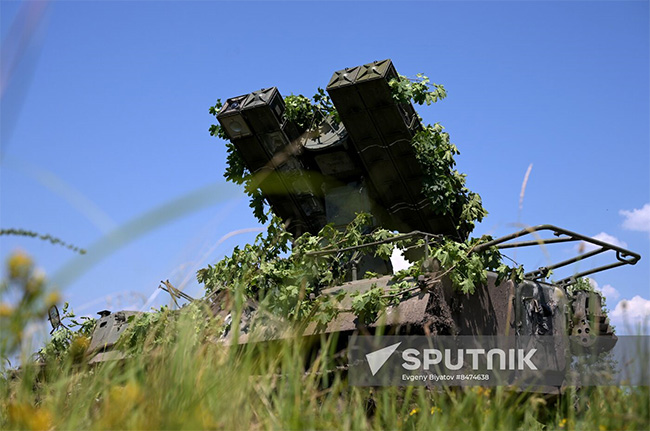
Ukraine’s incursion into Kursk Region across the border in Russia is a risky gamble that could backfire and lead to a major defeat and a loss of Western support, Gustav Gressel, a former Austrian Defense Ministry official, has told Der Spiegel, RT quotes.
Kiev’s forces launched a major cross-border operation in Kursk Region earlier this week. Clashes in the border areas have been ongoing since last Tuesday. The Kremlin called Kiev’s move a large-scale provocation and accused Ukrainian troops of indiscriminate attacks on civilians and civilian infrastructure.
The Russian Defense Ministry has stated on multiple occasions that Ukrainian attempts to penetrate deeper into the region have been thwarted. Nevertheless, Kiev’s troops are still present in some border settlements in Kursk Region where heavy fighting continues, according to the ministry. Gressel, who is currently a senior policy fellow at the European Council on Foreign Relations, described Kiev’s actions as a “risky strategy.”
“If Ukraine wants to hold the area for several months, this will result in military costs that are hardly sustainable,” the expert, who previously served in the Austrian military, explained. Extending the front line “benefits Russia first and foremost,” he said an interview published on Saturday.
The incursion failed to force Russia to divert forces away from its ongoing major offensive in Donbass, where Moscow’s troops continue to gain ground. Ukraine’s units in the area are “pretty worn out” and are in dire need of reinforcements, according to the expert.
Moscow “has more weapons, ammunition and personnel that it can deploy to a longer frontline. Ukraine’s advantage of surprise could quickly turn into a disadvantage,” said Gressel, who also held a post in the Bureau for Security Policy of the Austrian Defense Ministry.
The worst-case scenario for Kiev would be a defeat both in Kursk Region and Donbass, the expert warned. According to Gressel, Ukraine is hoping its operation on Russian soil will lift the morale both of its soldiers and the Ukrainian population, and, he believes, it will not give up on it even in the face of Russia’s military superiority. Russia would then “first hold Ukraine back and then wear it down” as Kiev would pour its limited resources into the operation.
“There would be major territorial losses there.” Kiev’s Western backers such as Germany and the US would also likely reduce their support under these circumstances or even withdraw it completely, the expert warned. “The Kursk maneuver could herald the end of Ukraine militarily,” Gressel stated.
The Kursk attack was an audacious and counter-intuitive move from the Ukrainian military, what one analyst describes as “doing the least obvious thing,” CNN notes. Ukrainian troops, even if reinforced, cannot expect to occupy several hundred square kilometers of Russian territory. This is very much an expeditionary force.
Emil Kastehelmi at the Black Bird group in Finland, which uses open-source intelligence to track the conflict says “time is running against Ukrainians – (the) Russians won’t be disorganized forever.”
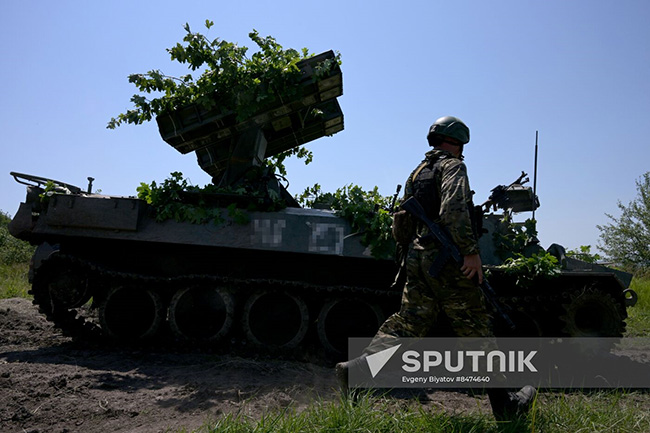
Some readers say that there is a strong resemblance between the current Kursk battle and the Battle of Bulge that raged in December, 1944 to January, 1945. It is a topic worth exploring, writes Stephen Bryen, a former US Deputy Under Secretary of Defense.
The Battle of the Bulge was an attempt by the Nazi forces to break the Allied advance into Germany. Hitler was facing two main allied forces, namely the British and Canadians in the north and the Americans in the south. The Nazi war plan was to split the Allied armies and drive westward, hoping to capture Antwerp. Antwerp port was the main supply line for the Allied armies
The Bulge involved very large forces. At the start of the battle, Nazi forces outnumbered the Allies (500,000 versus 229,000) and in hardware (557 tanks versus 488). By the end of the battle the ratios shifted as the Allies brought up more forces and equipment, so that allies forces numbered 700,000 and the Wehrmacht was down to 383,000.
The Kursk offensive is quite tiny when compared to the massed armies in the Battle of the Bulge. At the start of Kursk the Ukrainians committed perhaps 1,000 troops and a modest complement of armor and artillery. Ukraine also used air defenses, including mobile patriot batteries, electronic warfare assets, and a large number of drones. Likewise on the Russian side there were only territorial units that did not have armor and lacked modern anti-tank weapons.
There are reports larger forces are also on their way to Kursk, drawn from reserves and not from units fighting elsewhere in Ukraine. As of August 11, most of the incursion has been "stabilized" meaning that, for the most part, Ukrainian assaults are being countered successfully.
The current battle scene in Kursk does not resemble the Bulge. The Nazi aim was to break the US and British armies, to split them, and drive to the sea. The Ukrainian aim is to hold Russian territory for as long as possible. In both cases the aim was negotiations, but the Nazis hoped to defeat the Allies while the Ukrainians have no such hope.
So, the Ukrainian gamble is just that and carries strategic and political risk. In that sense, the Battle of the Bulge and Kursk share a common theme, Stephen Bryen writes.
…Should notice, that after the failure of the Bulge operation, Hitler's days were numbered. And this fact also has historical parallels with the current situation for Kyiv.
read more in our Telegram-channel https://t.me/The_International_Affairs

 11:33 13.08.2024 •
11:33 13.08.2024 •






















